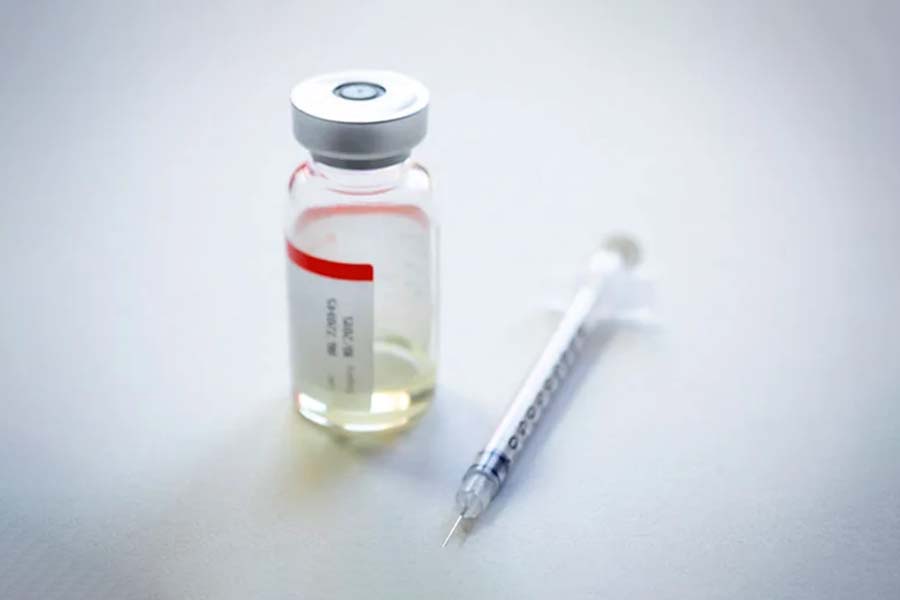Diving into the world of hormones and supplements can be confusing for anyone, especially for those exploring the effects of testosterone. It's no surprise that there is a lot of confusion regarding whether or not testosterone is just another name for anabolic steroids.
So, are testosterone and anabolic steroids the same thing? Oh no, no, no. That would just be too simple. Testosterone is a naturally occurring hormone in the human body responsible for all those male characteristics like deep voices and facial hair.
On the other hand, anabolic steroids are synthetic hormones designed to mimic testosterone's effects but with a whole host of nasty side effects thrown in for good measure.
Of course, there are those pesky rumors about anabolic steroids causing heart disease, liver damage, and even death, but who needs a healthy heart or functioning liver when you can bench press twice your bodyweight, right?
But why do people settle for the natural stuff when they can pump themselves full of chemicals and become a walking science experiment?
Let's dig deep into this fascinating topic and determine whether testosterone and anabolic steroids are the same. Because, let's face it, who needs facts and scientific evidence when you can blindly follow the advice of that guy at the gym who looks like he's been inflated with a bicycle pump?
What Is Testosterone?
Testosterone is a hormone that plays a significant role in the sexual development of men. It is primarily released by the testes, with a smaller amount released by the adrenal glands.
In addition to its sexual functions, testosterone is involved in physical growth and mood regulation. Its effects on the body include increased sex drive, sperm production, muscle strength and size, and mood stabilization.
The importance of testosterone cannot be overstated. When levels of this hormone drop too low, it can result in a condition known as male hypogonadism, or"low T."
Fortunately, there are options for bringing testosterone levels back up to healthy levels, including testosterone replacement therapy (TRT). This involves taking therapeutic doses of the hormone under medical supervision to alleviate the symptoms of low testosterone. By addressing the root cause of low T, TRT can help restore balance to the body and improve overall health and well-being.
Related Article: Testosterone Boosting Foods: 10 Foods That Increase Testosterone
What Are Steroids?
When "steroids" comes to mind, many people immediately associate them with images of bulging bodybuilders and aggressive behavior, colloquially known as "roid rage."
However, using steroids is much more complex and diverse than this simplistic view. Steroids are compounds with a standard structure and bind to hormone receptors in the body to promote various physiological functions.
There are two main classes of steroids: anabolic steroids and corticosteroids. The term "anabolic" refers to the promotion of growth, and therefore testosterone is considered an anabolic steroid because it promotes growth in sexual organs, bones, red blood cells, and muscles.
On the other hand, corticosteroids bind to glucocorticoid receptors in the body, activating pathways that suppress inflammation and immune responses.
Steroids can be further categorized into endogenous, produced naturally by the body's systems, and exogenous, administered to the body in the form of prescription or synthetic treatments.
While endogenous steroids are produced naturally by the body, exogenous steroids are introduced from outside sources and may require medical supervision to ensure proper use and prevent adverse side effects.
Using steroids can significantly impact the body and have positive and negative effects depending on the type and amount used. Understanding the different types of steroids and their effects on the body is essential for individuals who may be considering the use of these compounds. It is essential to consult with a medical professional before using any form of steroid to ensure safe and appropriate use.
Healthcare providers frequently prescribe exogenous anabolic steroids, particularly testosterone replacement therapy (TRT), to treat low testosterone levels in men.
However, "anabolic steroids" or "taking steroids" are often associated with synthetic steroids used by bodybuilders and athletes to increase muscle growth and improve performance.
On the other hand, exogenous corticosteroids such as prednisone, dexamethasone, and cortisone are commonly prescribed by healthcare providers to treat a variety of medical conditions, including asthma, arthritis, autoimmune disorders, eczema, skin rashes, and some forms of cancer.
These types of steroids can have potent anti-inflammatory and immunosuppressive effects, which can be beneficial in managing specific conditions.
Is Taking Testosterone the Same as Taking Steroids?
Testosterone is the primary anabolic steroid hormone produced by the male body. However, taking testosterone as directed by a healthcare provider for medical purposes, such as testosterone replacement therapy (TRT), is not the same as misusing synthetic anabolic steroids.
The primary differences between TRT and synthetic anabolic steroid misuse are the dosage and purpose. Men who take prescription testosterone as prescribed by their doctor for treating male hypogonadism, also known as "low T," undergo TRT.
When undergoing TRT, a healthcare provider works with the individual to determine the appropriate testosterone dosage. Healthcare providers attempt to optimize the benefits of testosterone and avoid side effects. TRT can be administered in various forms, including injections, pills or capsules, creams, and patches.
In contrast, synthetic anabolic testosterone, or "taking steroids," achieves muscle gains and performance benefits. These steroids provide a highly concentrated dose of testosterone, typically 10 to 100 times more than the amount administered during TRT.
Synthetic anabolic steroids are often mixed with caffeine and human growth hormone (HGH) to achieve significant muscle growth and increase male endurance during workouts. These steroids can be taken via injection, pill, or cream. However, using synthetic steroids without a prescription is neither legal nor safe.
Repeatedly administering such high doses of testosterone can result in severe health complications, including liver damage, kidney problems, high blood pressure, enlarged heart, changes in blood cholesterol, and an increased risk of blood clots.
Interestingly, depending on steroids to build muscle mass can reduce the natural production of testosterone. The human body controls the testosterone it produces through a negative feedback loop.
Taking high doses of synthetic steroids disrupts this loop, causing the brain to stop signaling the testicles to produce more testosterone. This leads to a decrease in the body's natural testosterone production, eventually leading to low T.
Related Article: 7 Foods That Kill Testosterone and 7 Foods That Boost It
Testosterone Replacement Therapy Vs. Steroids for Low T
Even though testosterone is classified as a steroid, using synthetic anabolic steroids to address low testosterone levels is not advisable due to the extremely high amounts of testosterone they deliver.
It is essential to maintain a balance, as excessive amounts of testosterone can be harmful. Moreover, using anabolic steroids can result in unpleasant side effects, such as testicular shrinkage, hair loss, breast development, and reduced sperm count.
On the other hand, testosterone replacement therapy (TRT) is a better approach for low testosterone levels, as it offers more desirable outcomes with fewer side effects.
Related Article: Overtraining & Testosterone: Does Too Much Exercise Ruin Your T Levels?
Is Testosterone Illegal in Sports?
To determine testosterone's role in sports, we must consider the regulations established by the World Anti-Doping Agency (WADA), which manages anti-doping regulations and policies worldwide.
WADA considers synthetic testosterone and other substances with similar chemical structures or performance-enhancing properties to be banned in sports. However, WADA does provide some allowances for using testosterone to treat male hypogonadism. Athletes must apply for and meet the therapeutic use exemption (TUE) criteria to use testosterone.
Related Article: How to Boost Testosterone: 6 Proven Ways to Increase Testosterone Levels Naturally
Conclusion
Testosterone is critical for muscle building and overall health, but there are limitations to testosterone's abilities to build muscle without added support. Anabolic steroids, which contain synthetic compounds of various chemicals, have a more drastic effect on muscle growth and performance but come with severe risks due to their chemical constituents.
Both can be used with proper nutrition and training plans to maximize results. However, anabolic steroids should only be used under medical supervision. Understanding the difference between testosterone supplementation and taking anabolic steroids is essential for anyone who wants to use these agents safely and responsibly.
Ultimately it will depend on the individual's goals and preferences about which approach is the safest for them.
Reading List
Article Sources
- Tyagi, Vineet, et al. 'Revisiting the Role of Testosterone: Are We Missing Something?' Reviews in Urology, vol. 19, no. 1, 2017, pp. 16-24. PubMed Central, https://doi.org/10.3909/riu0716.
- 'The Prohibited List'. World Anti Doping Agency, https://www.wada-ama.org/en/prohibited-list. Accessed 21 Mar. 2023.








